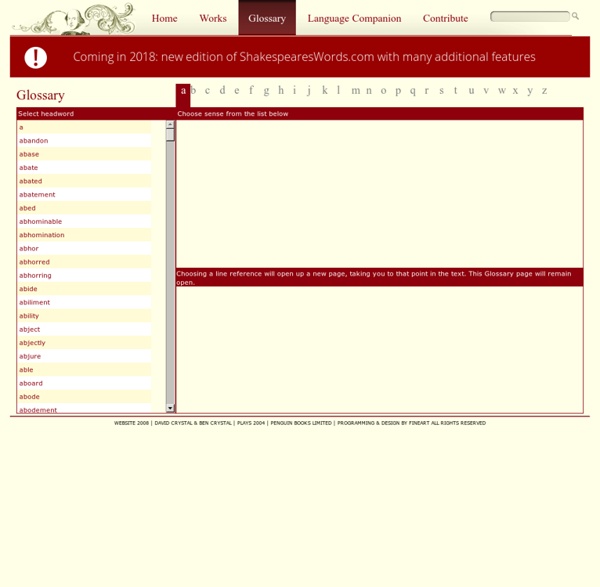



The Sonnets You can buy the Arden text of these sonnets from the Amazon.com online bookstore: Shakespeare's Sonnets (Arden Shakespeare: Third Series) I. FROM fairest creatures we desire increase,II. When forty winters shall beseige thy brow,III. Look in thy glass, and tell the face thou viewestIV. Unthrifty loveliness, why dost thou spendV. Shakespeare Sonnet 130 - My mistress' eyes are nothing like the sun My mistress' eyes are nothing like the sun; Coral is far more red than her lips' red; If snow be white, why then her breasts are dun; If hairs be wires, black wires grow on her head. I have seen roses damask'd, red and white, But no such roses see I in her cheeks; And in some perfumes is there more delight Than in the breath that from my mistress reeks. I love to hear her speak, yet well I know That music hath a far more pleasing sound; I grant I never saw a goddess go; My mistress, when she walks, treads on the ground: And yet, by heaven, I think my love as rare As any she belied with false compare. Paraphrase and Analysis of Sonnet 130 Even More... Portraits of Shakespeare Shakespeare's Contemporaries Shakespeare's Sexuality Worst Diseases in Shakespeare's London Shakespeare on the Seasons Shakespeare on Sleep Stratford School Days: What Did Shakespeare Read? Games in Shakespeare's England [A-L] Games in Shakespeare's England [M-Z] An Elizabethan Christmas Clothing in Elizabethan England
The Nardvark: IB English If you get the joyous privilege of studying a poem with rhythm and metre, you need to understand what rhythm and metre mean. No matter how many times Nardvark’s teacher explains it, no matter how many diagrams and Powerpoints she uses and how many times she claps her hands, Nardvark just doesn’t get it. And that’s NOT because he is sitting in the back of the classroom reading his friends’ tweets from math class, honest! Rhythm: George and Ira Gershwin had rhythm. Eg: Mary had a little lamb, its fleece was white as snow. In the well-known nursery rhyme, the syllables that your voice stresses when you say them are bold. Eg: I've got the moves like Jagger. In the well-known song lyric above, every second syllable is stressed. OH! So where does the “Pentameter” part come in? Ok, we’re getting to that. There are other rhythms besides iambic. Meters with two-syllable feet are: IAMBIC (da-DUM, or x /) eg: I've got the moves like Jagger. Meters with three-syllable feet are One foot = monometer
About the author | Springboard Shakespeare Ben Crystal Ben is an actor and writer. He studied English Language and Linguistics at Lancaster University before training at Drama Studio London. He has worked in TV, film and theatre, including at the reconstructed Shakespeare’s Globe, London, and has narrated for RNIB Talking Books, Channel 4 and the BBC. He co-wrote Shakespeare’s Words (Penguin 2002) and The Shakespeare Miscellany (Penguin 2005) with David Crystal, and his first solo book, Shakespeare on Toast – Getting a Taste for the Bard was published in 2008 (Icon). He regularly gives workshops on performing and speaking Shakespeare via Passion in Practice.
Shakespeare's Sonnets Open Source Shakespeare: search Shakespeare's works, read the texts Shakespeare Sonnet 18 - Shall I compare thee to a summer's day More to Explore Introduction to Shakespeare's Sonnets Shakespearean Sonnet Style How to Analyze a Shakespearean Sonnet The Rules of Shakespearean Sonnets Shakespeare's Sonnets: Q & A Are Shakespeare's Sonnets Autobiographical? Petrarch's Influence on Shakespeare Themes in Shakespeare's Sonnets Shakespeare's Greatest Love Poem Shakespeare and the Earl of Southampton The Order of the Sonnets The Date of the Sonnets Who was Mr. Who was The Rival Poet? Shakespeare on Jealousy Shakespeare on Lawyers Shakespeare on Lust Shakespeare on Marriage Blank Verse and Diction in Shakespeare's Hamlet Analysis of the Characters in Hamlet Shakespeare on the Seasons Shakespeare on Sleep
World Lit Assignments: Advice « IB English A1 by Mr. MacKnight (80) on January 24th, 2008 As an assistant examiner for the IB, I mark World Lit essays every year. Here is an excerpted version of the examiner’s report that I submitted last year after finishing my marking. It highlights some of the common problems so that you can avoid them! 1. Not surprisingly under such circumstances, most students simply retail ideas that their teachers or other sources have fed them. The assignment(s) I am submitting is (are) my own work. Failing to acknowledge use of their teachers’ ideas with a simple ‘as discussed in class’ casts suspicion on the provenance of every other observation they make. Literature as ‘The Search for Hidden Meanings’ and students’ retailing of potted interpretations go together, of course. 3. Other miscellaneous comments: Assignment 2: be sure to label 2a, 2b, or 2c, depending on your choice. Label essays ‘Assignment 1′ and ‘Assignment 2′. Page citations should be unobtrusive. 36 people like this post.